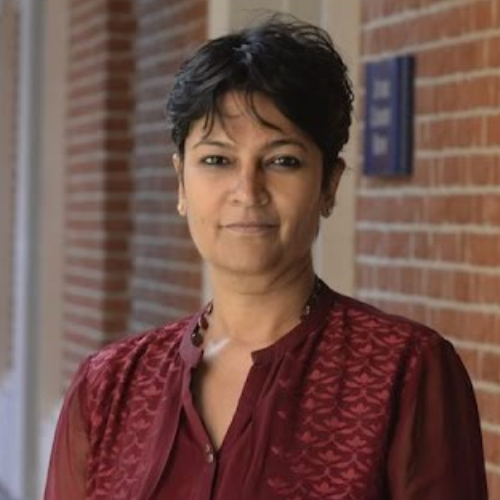الدكتورة راميا سوبرامانيان هي رئيسة الأبحاث المتعلقة بالنوع الاجتماعي والحقوق والحماية في مكتب اليونيسف إينوسونتي – المكتب العالمي للبحوث والاستبصار بفلورنسا، إيطاليا. وهي تقود فريقًا من الباحثين الذين يعملون في قضايا مثل العنف ضد الأطفال والنساء، والهجرة والنزوح، وعمالة الأطفال، والممارسات الضارة مثل زواج الأطفال وتشويه الأعضاء التناسلية الأنثوية، وغيرها. خلال مسيرتها المهنية التي امتدت لأكثر من 30 عامًا، عملت راميا في العديد من البلدان والمنظمات المختلفة. في السابق، كانت المديرة التنفيذية لمنظمة “التعرف على العنف في مرحلة الطفولة”، وهي مبادرة تعليمية عالمية مستقلة تركز على منع العنف. قبل ذلك، عملت في مكتب اليونيسف في الهند كأخصائية في السياسات الاجتماعية حيث أنشأت برنامجًا وطنيًا للبحث وتحليل السياسات في مجالات الحماية الاجتماعية المراعية للأطفال، والمالية العامة، والإنصاف والاندماج الاجتماعي، والمساواة بين الجنسين. وكانت زميلة باحثة في معهد دراسات التنمية بجامعة ساسكس، حيث شاركت في إدارة وتدريس برنامج الماجستير في النوع الاجتماعي والتنمية. راميا حاصلة على درجة الدكتوراه في دراسات التنمية والماجستير في النوع الاجتماعي والتنمية.
ملخص المداخلة
عنوان المداخلة
منع العنف في المدارس: لمحة عن حالةالمعطيات المرتكزة على الوقائع
Violence experienced in childhood is a multi-dimensional, multi-sited phenomenon. Children experience multiple forms of violence in homes, schools, communities at great cost to their physical, mental and emotional health and development. Schools are both a place of safety for children, where they can learn practices of non-violence and non-discriminaton and develop positive capabilities, and also a place where wider social dynamics of inequality and conflict are played out through the exercise of violence. Strengthening schools’ capacities to reinforce the former, and prevent or address the latter is a key component of more effective child protection and central to the fulfillment of child rights. Over recent years, there have been several initiatives to test interventions to address violence against children in schools, whether aimed at teachers, or at addressing peer violence. While the evidence base is still growing, there are many lessons that can be learned from studies of programmes that have had a positive impact on school environments, reducing violence such as bullying, the use of harsh discipline, and promoting safe use of digital technologies. These point both to the possibility of making schools safe learning spaces for children, and to the potential of ending violence in schools.

